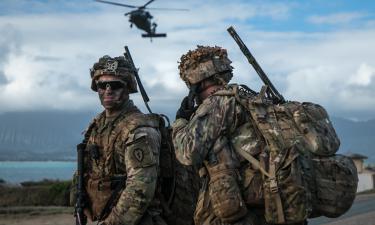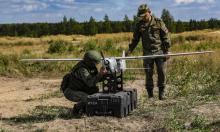Georgian forces detain Russian peacekeepers' motorcade in South Ossetia
This night, the Georgian Interior Ministry has detained a Russian peacekeeping motorcade near the village of Tkviavi in South Ossetia (former Georgian province, now a self-proclaimed republic).
A peacekeeping operation in the area was authorized in 1992 when an armed conflict broke out between Ossetians and Georgians living in local villages. It was largely triggered by then Georgian president Zviad Gamsakhurdia's order terminating the autonomous status of South Ossetia.
The Georgian Interior Ministry told RIA Novosti that six trucks of the motorcade that carried fuel and food had been returned to the peacekeepers, while the other four vehicles loaded with military hardware and air-launched rockets had been confiscated and delivered to the Georgian town of Gori without going through peacekeeping checkpoints via diversion routes.
The Interior Ministry also named its head Irakly Okruashvili as the one in charge of the operation.
Commander of the Mixed Peacekeeping Force in the Georgian-Ossetian conflict area Major General Svyatoslav Nabdzorov, talking to reporters on Wednesday, described the action as provocative.
According to him, the passage of this motorcade from the Russian North Caucasian republic of North Ossetia into the conflict area had been authorized at the July 2 meeting of the co-chairmen of the Mixed Control Commission in South Ossetian capital Tskhinvali.
Gen. Nabdzorov recalled that the commission had agreed to deploy an air traffic control post as part of the Mixed Peacekeeping Force, the air-launched rockets seized by the Georgians being intended to arm helicopters assigned to patrol the local airspace.
He said that the motorcade was seized by the Georgian police as well as by about two hundred personnel of the Georgian Interior Ministry Troops and several armored vehicles that had no right to enter the conflict area.
Russian servicemen escorting the cargo, he said, did not put up resistance to avoid triggering an armed clash.
Thus, the Russian general concluded, Georgia had grossly violated previously signed agreements, which greatly aggravated the situation in the area.
For the record, recently South Ossetian leader Eduard Kokoyty said he had intelligence that Georgia was preparing a large-scale provocation in the region. He said that Georgian armor, thousands of servicemen, and the Forest Brothers insurgent armed group were concentrated along the Georgian-Ossetian border.
Subscribe to Pravda.Ru Telegram channel, Facebook, RSS!





